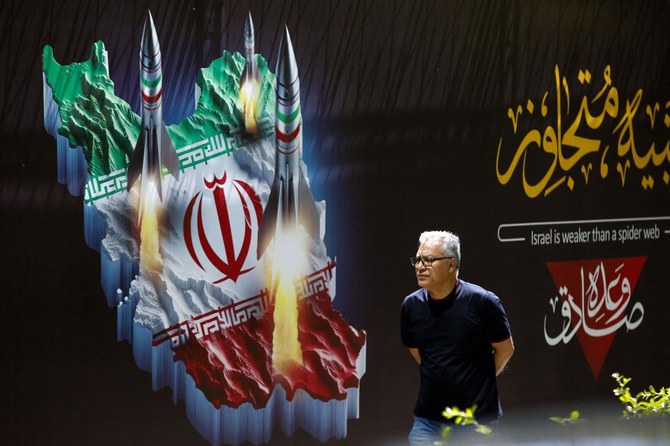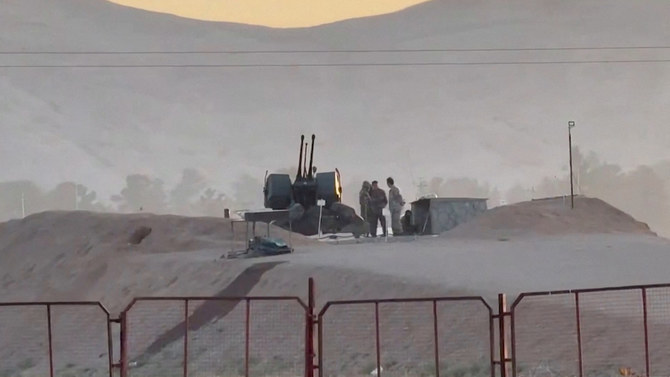LONDON: Hashem Al-Ghaili has come a long way from his family’s qat farm in northern Yemen, he now communicates complex theories of physics to millions of followers.
As a young boy growing up in northern Yemen, Al-Ghaili already knew he wanted to be a scientist — but his father had other ideas.
Al-Ghaili senior grows qat, the mildly narcotic herb beloved of Yemenis and the people of the Horn of Africa, and he expected Hashem, 10th of his 12 children, to work on the farm with him. Indeed he demanded it, brushing away any dissent.
“I tried because it is very difficult in Yemen to go against your parents’ wishes, but in the end I had to follow my dream,” said Al-Ghaili.
Today, Al-Ghaili, 27, is a scientist and a media star with an army of fans avidly following his online mini-films in which he explains science to non-scientists.
He began posting occasional videos with a commentary in 2009. He taught himself graphics and editing and launched a Facebook page, just to share with friends. The group continued to grow and by the end of 2015, he had acquired 66,000 followers. Now he has 24 million followers globally and has racked up a staggering eight billion views on Facebook.
What began as a hobby made him a science superstar. But despite his natural ability, it hasn’t been easy.
His communication skills were evident at school where he would read aloud to the class “and explain things.” He was six.
At age 16 when he graduated from high school, he secretly applied for a government scholarship to study abroad. He had to go to the capital, Sanaa, to fill out the paperwork and made the six-hour journey without telling his father.
“I called him from Sanaa and he was really upset.” Angry, upset or disappointed? “I’d say angry. But I told him I was going to do this against all odds and he realized then that there was nothing he could do.”
Al-Ghaili secured the scholarship, but that didn’t mean he could study the subject he wanted at the university of his choice.
“People with connections get places in Europe and America. The rest of us get the leftovers and even then, the computer randomly chooses for you. I requested physics in Egypt or Jordan and I got biotechnology in Pakistan.”
Another shock awaited him when he arrived at the University of Peshawar and realized that his schoolboy English was not good enough to follow the tutorials and there was no language course he could sign up for that could bring him up to the required level. Undeterred, he set about teaching himself English from online tutorials that he was able to watch after borrowing money to buy a laptop.
“Peshawar wasn’t a very safe place back in 2008 so I wasn’t going out much. Within three months I was ready,” he said.
He graduated with a first-class degree and was appointed the university’s ambassador to Yemen.
He then applied for a scholarship to study for a master’s degree in Germany and became one of only five applicants out of 1,070 to be awarded a scholarship.
“So I had the scholarship, but to get the visa I had to have a place at a university, which I didn’t. But I couldn’t risk missing my chance,”
He arrived in Dresden, Germany, and spent five months learning German and applying to universities.
“I sent off 70 applications in one day. Most didn’t reply at all, a few said applications were closed and one replied saying: ‘Let’s talk.’”
That was Professor Sebastian Springer of Jacobs University, an English-language institution in Bremen, northern Germany, which has students from around 80 countries.
“DAAD (the scholarship-awarding body) made a strong recommendation for his exceptional communication abilities and his extraordinary dedication,” said Prof. Springer.
“In my interview, Hashem came across as a very dedicated and professional person who spoke excellent English and his gift of communication was already very clear.”
But a further shock awaited Al-Ghaili in Bremen, the course he had studied in Pakistan had been more theoretical. "I didn’t know how to conduct experiments or how to use the equipment. I was devastated.”
He confided his concerns to Prof. Springer. “He said he knew I was worried, and if I had not come to him, he would have known I was not serious about my studies. He said, ‘I’m here to help you.’ He was so supportive and I owe him a lot. I got the hang of the practical work and in the end I excelled at it.”
After he got a top grade in his master’s degree he was chosen to give the students’ speech at the graduation ceremony. He embarked on a doctorate, but gave it up after three months as his communicator role gradually took precedence over his science.
“I couldn’t do both and I realized I was better at the communicating.”
The online comments he gets bear this out. Many are of the “Wow, this is awesome!” variety. In response to a film about the history of the universe, from birth to now, one wrote: “This was the most amazing and educational six minutes and 11 seconds of my life.”
Al-Ghaili says he chooses topics that interest him or that could be useful.
“It might be a medical breakthrough or something to do with the environment, or correcting misconceptions about GM [genetically modified] foods or vaccines or climate change.”
Inevitably, he has faced criticism from Internet trolls calling him a fake and saying he should be arrested. He no longer reads the comments.
“I can’t screen hundreds of thousands of them. I only read them if they require intervention. I don’t care about the personal comments, but I won’t have them spreading misinformation.”
A particularly proud moment for him came two years after he got his master’s when he was invited on to a discussion panel with Randy Schekman, Nobel laureate in medicine, a powerful illustration of how far he has come.
His determination has also paid off for others as three siblings, including two sisters, have also gone to university. His brother has been studying business administration in Malaysia, one sister is a journalist and poet and the other is studying economics.
He is especially pleased for his sisters. “Women in Yemen are trained to accept what others decide for them. They don’t even know their rights. My dad is very proud now and convinced about education. He keeps track of everything I do. We speak every week.”
He lives in Berlin describing the city as “a great central hub for start-ups and collaboration,” but woefully lacking in Yemeni restaurants: “I mean, there’s not a single one anywhere in all of Germany!”
He now has four people to help him with sourcing video, editing and writing scripts. But nothing goes through without his approval. His current big project is “Simulation,” a science fiction short film he has written, directed and funded and intends to show at film festivals and then sell online.
He has not seen his family since 2013 and as the war rages on in Yemen he has no idea when he will. Doing what he does from Yemen would be difficult. “Talking about things like the Big Bang can get you into trouble,” he said.
But he feels a responsibility to represent his country well and longs to see it flourish.
“Being rich can make you a bit lazy,” he said. “Yemen is a poor country, but we have creative people.”























